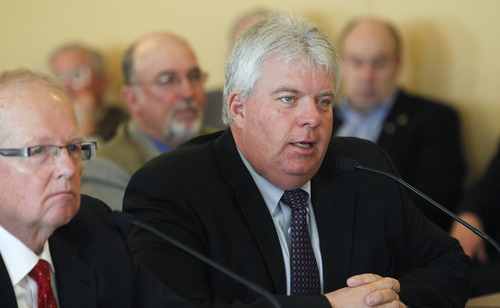This is an archived article that was published on sltrib.com in 2013, and information in the article may be outdated. It is provided only for personal research purposes and may not be reprinted.
Legislative leaders on Monday ordered an audit to examine how a political-action organization has spent Utah taxpayers' money in an ongoing effort to wrest control of wolf management from federal hands.
Big Game Forever, a Utah-based nonprofit that spun off Sportsman for Fish and Wildlife in 2010, has secured hundreds of thousands of dollars in state money during the past four years to evict the gray wolf from the endangered species list. But the group's founders Don Peay and Ryan Benson have not disclosed where the money goes in their reports to the Legislature and to the Utah Division of Wildlife Resources (DWR).
State auditors have already made informal inquiries into how the group spent a $300,000 appropriation for fiscal year 2013. But because Big Game Forever "commingles" its funds from multiple sources, it might not be possible to determine exactly what Utah taxpayers' money bought, according to Legislative Auditor General John Schaff.
"How do I know that receipt is for state money versus funds coming from other sources?" Schaff told the legislative audit subcommittee Monday. "The problem is this is a private company. We have authority to look at state funding. We don't have authority to look at funding from other sources."
This did not sit well with Senate Minority Leader Gene Davis, D-Salt Lake City, who requested the audit.
"I would like to see accountability on the half million that has been spent. I would like to see where that money went and for what purposes," Davis said.
Meanwhile, Big Game Forever is poised to receive a second $300,000 state appropriation for fiscal year 2014. Davis argued that DWR, which manages the contract with Big Game Forever, should withhold the money pending the release of the audit.
The audit subcommittee, however, lacks the authority to do that, but some lawmakers may ask DWR to sit on the money.
The panel did ask Schaff to find out what other states, if any, are funding Big Game Forever, how much they contribute and to explore how it will spend the next $300,000.
During the legislative session, Peay told lawmakers he was going to use the money to block federal attempts to "introduce" Mexican gray wolves into southern Utah, even though there is scant evidence such a plan is afoot.
Schaff said he intends to also examine how Big Game Forever spent two earlier $100,000 DWR grants in pursuit of "legal and legislative solutions to return management for gray wolves to the state of Utah." The grants — from state general-fund monies, not from fees on sportsmen as previously indicated — required the group to keep accounting records "for state review if requested."
A DWR official said the agency had never requested to review those records.
Big Game Forever executive Benson, a Salt Lake City lawyer, has not responded to several requests for comment.
Last week, he submitted a 120-page report to DWR summarizing Big Game Forever's "accomplishments" arising from the $300,000, but it shed little light on its spending other than to attribute various amounts in five broad categories. It did say the group used the appropriation to obtain "matching dollars," but it provided no numbers.
"Normally you report how much and where it came from," said Rep. Patrice Arent, D-Millcreek, another critic of the appropriation. "Maybe I'm missing something. I have worked for non-profits my whole life. You get paid as you submit expenses or as you complete the work."
One of the appropriation's chief backers, Senate Majority Leader Ralph Okerlund, R-Monroe, welcomed the audit.
"I think they will find the money was spent very well," he said.
The feds have long signalled an intent to delist the gray wolf from federal protection across the nation, so critics like Davis wonder why Utah should divert money to a politically connected special-interest group to fight a battle that appears won.
The Fish and Wildlife Service formally proposed delisting last month, paving the way for states to manage wolf populations.
Wolves were exterminated from Utah by 1930, but they are expected to return should the populations in the Northern Rockies continue to expand into their historic range to the south.



